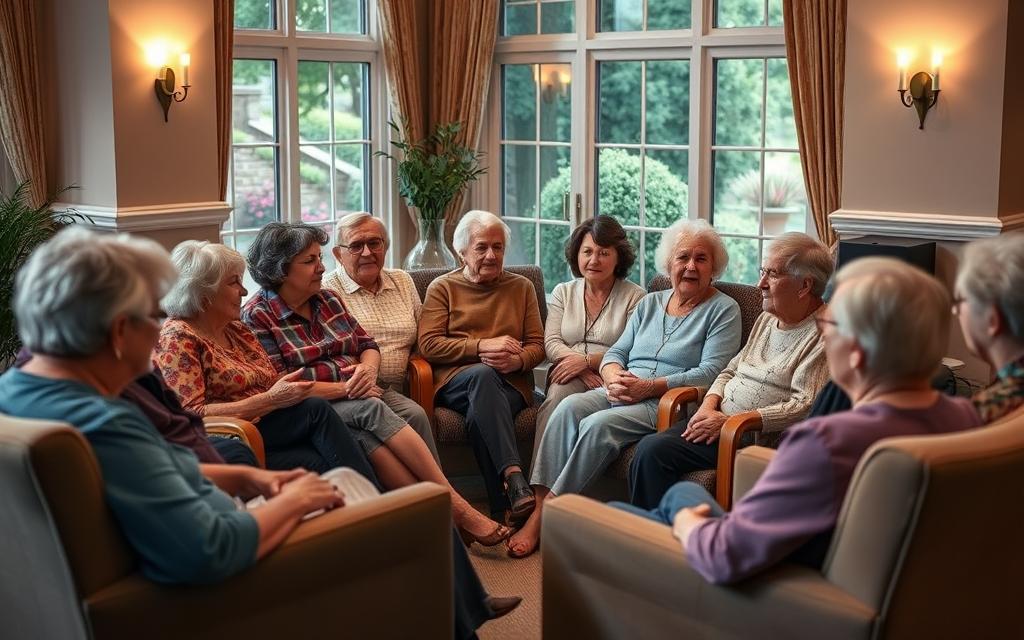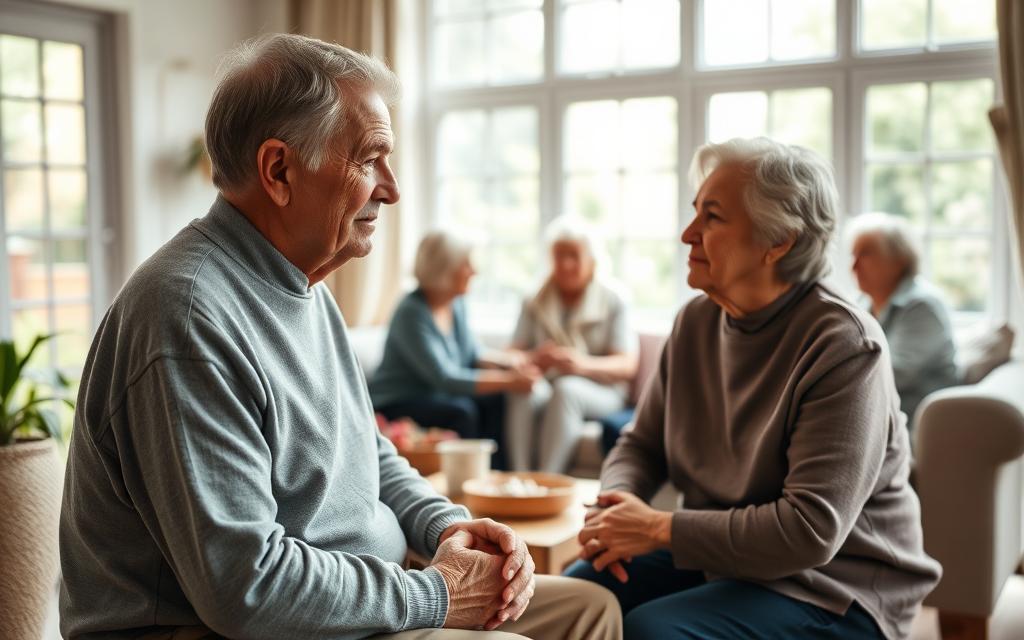Senior Citizens and Depression: Ways to Reclaim Your Joy
As we get older, life can get tougher. You’re not alone in facing these challenges. It’s key to know that senior citizens and depression are closely tied.
Have you ever wondered why some older adults seem to lose their spark? Others keep thriving. What if you could find your joy again, even with aging’s challenges?
Depression isn’t a normal part of growing old. It’s important to tackle it. Most older adults are happy with their lives, even with more health issues than younger folks. You can find your joy and wellbeing again. It’s never too late to start. By understanding senior citizens and depression, you can begin a happier, healthier life.
Key Takeaways
- Depression is a common problem among older adults, but it’s not inevitable.
- Most older adults feel satisfied with their lives despite physical challenges.
- There are ways to reclaim joy and wellbeing in older age.
- Understanding the link between aging and depression is key.
- You can take steps to improve your mental health and wellbeing.
Understanding Depression in Older Adults
Depression in older adults is special. It’s hard to spot because it looks different than in younger people. Depression in older adults might show as not caring about things, eating less, or sleeping too much or too little.
How Depression Differs in Seniors
Seniors might not show sadness like younger people do. They might feel numb or get angry easily. They could also worry a lot or feel sick without a reason.
Doctors need to watch closely for these signs. They must make sure it’s depression and not something else like dementia or thyroid problems.
The Prevalence of Geriatric Depression
Geriatric depression is a big worry for everyone. It affects a lot of older adults. About 1% to 5% of those living at home and up to 14% in care homes have major depression.
It’s more common in those with long-term illnesses, in the hospital, or after losing someone. Knowing this helps us find ways to help geriatric depression.
Breaking the Stigma Around Senior Mental Health
Stigma is a big problem. Many seniors don’t talk about mental health because it was kept secret in the past. This makes them shy about getting help.
We need to talk more about mental health. We should help seniors feel okay about asking for help. Education and awareness can help change this.
Common Triggers of Senior Citizens and Depression
It’s important to know what makes older adults sad. As people get older, they face many challenges. These can affect their mental health.
Physical Health Challenges and Chronic Illness
Chronic illnesses and health problems can make seniors sad. Diseases like diabetes and heart disease can make them feel hopeless. A study showed that seniors with these illnesses often feel depressed.
Loss and Grief in Later Life
Loss and grief come with age. Losing a loved one can make seniors very sad. They might also feel sad about losing their independence or facing big changes.
Supporting seniors through these losses means being there for them. Listen and let them share their feelings.
Retirement and Identity Shifts
Retirement can change a person’s life a lot. Many seniors find their identity in their work. When they retire, they might lose their sense of purpose. Helping them find new hobbies can give them a new sense of meaning.
Medication Side Effects and Health Complications
Some medicines and health issues can make seniors sad. Some medicines can make depression worse. Doctors need to watch for these effects and change treatments if needed.
By understanding these triggers, we can help seniors deal with depression. This improves their overall well-being.
Recognizing the Warning Signs
It’s easy to miss the signs of depression in older adults. But knowing them is the first step to help. Depression in seniors shows up differently than in younger people. So, it’s key to spot the specific signs.
Physical Symptoms
Depression in older adults can show up as physical signs. These might be changes in appetite or weight, trouble sleeping, feeling very tired, or headaches. It’s important to tell if these signs are from depression or another health issue.
Behavioral Changes
Behavioral changes are also big signs of depression in seniors. These can be pulling back from friends, losing interest in things they used to like, or moving less. Family and caregivers should watch for these signs closely.
When Sadness Becomes Clinical Depression
Feeling sad or grieving is normal sometimes. But clinical depression is more serious and lasts longer. Knowing the difference is key to getting the right help. It can really hurt someone’s daily life and happiness, and they need professional help.
The Difference Between Dementia and Depression
Dementia and depression can look similar in older adults. Dementia mainly affects memory and thinking. Depression is about feeling sad and losing interest for a long time. Even though they can happen together, it’s important to tell them apart for the right treatment.
Spotting the signs of depression in seniors is a big step in helping them. By knowing the physical and behavioral signs, and telling depression from dementia, we can help our loved ones a lot.
The Impact of Loneliness on Mental Wellbeing
As people get older, they might feel more alone. This can hurt their mental health. Life changes, like retirement, can make them feel lonely.
Social Isolation in Aging Populations
Older adults often feel left out. This happens when they don’t see or talk to people much. It’s because of things like losing a partner or health problems.
Factors contributing to social isolation include:
| Factor | Description | Impact |
|---|---|---|
| Loss of a spouse | Grief and reduced social interaction | Increased feelings of loneliness |
| Retirement | Change in daily routine and social structure | Potential loss of identity and purpose |
| Health issues | Reduced mobility and ability to engage in social activities | Increased dependence on others |
The Connection Between Loneliness and Depression
Feeling lonely can make you sad. Long-term loneliness can turn into depression. It’s important to notice loneliness early to stop depression.

Creating Meaningful Connections in Later Years
It’s key for seniors to meet people. They can join groups, do hobbies, or help others. These things help them feel needed and part of a group.
Some strategies for creating meaningful connections include:
- Engaging in community activities
- Pursuing hobbies and interests
- Volunteering for causes they care about
Addressing Senior Isolation During Life Transitions
Big changes, like moving or losing someone, can make seniors feel lonelier. We need to support them. This helps them stay connected with friends and family.
Understanding loneliness’s effect on mental health is important. By acting early, we can help seniors stay happy and healthy.
Medical Approaches to Elderly Depression Treatment
Understanding how to treat depression in older adults is key. It’s important to use a mix of treatments. This mix should fit the person’s health, past, and life situation.
Medication Options for Older Adults
Medicine is a big part of treating depression in seniors. Selective serotonin reuptake inhibitors (SSRIs) are often chosen. They have fewer side effects than older medicines.
It’s important to watch how much medicine is taken. Also, how it might mix with other medicines.
Choosing the right medicine is very personal. It depends on the person’s health and other medicines they take. Some medicines work better for certain health problems.
Therapy Approaches That Work for Seniors
There are also therapy approaches that help older adults with depression. Cognitive-behavioral therapy (CBT) and interpersonal therapy (IPT) are good options. They help deal with the reasons behind the depression.
These therapies can be changed to fit what older adults need. They might include things like remembering happy times. Therapy works best when done with medicine.
When to Seek Professional Help
If a senior or their family sees signs of depression, they should get help. If the depression gets worse or is a danger, see a doctor right away.
Getting help early can make a big difference. Doctors can help figure out the best treatment and support.
Navigating Mental Health Services for Seniors
Finding mental health services can be hard for older adults. Family members and caregivers are very important. They help find the right care.
This might mean looking up local services, understanding insurance, and speaking up for the senior’s needs. It’s all about getting the right help.
Lifestyle Strategies for Managing Depression in Seniors
Changing your lifestyle can help with depression in older adults. Seniors can improve their mental health by making smart choices.
The Power of Physical Activity
Exercise is a strong way to fight depression. It makes you feel good by releasing special hormones. Walking, gardening, or yoga are great for seniors.
Tips for incorporating physical activity: Begin with short walks (10-15 minutes). Then, do more. Join groups to meet new people.

Nutrition and Mood: What You Should Know
Eating well can make you feel better. Eat lots of fruits, veggies, whole grains, and lean meats. Omega-3s in fish are good for your mind.
Nutritional tips: Drink plenty of water. Eat less junk food. Talk to a nutritionist for advice.
Sleep Hygiene for Better Mental Health
Good sleep is key to fighting depression. Sleep at the same time every day. Make your bedroom cozy and dark. Avoid caffeine and screens before bed.
Sleep hygiene practices: Don’t look at screens before bed. Keep your room cool and dark. Have a calm bedtime routine.
Mindfulness and Relaxation Techniques
Mindfulness, like meditation, can help with stress and depression. It makes you relax and feel better.
Mindfulness tips: Begin with short sessions (5-10 minutes). Use apps or videos to help you start.
By using these lifestyle changes, seniors can manage depression better. They can also live a happier life.
Finding Purpose and Joy in Later Life
You can find joy again by trying new things. Doing things that make you happy is key for your mind as you get older.
Discovering New Passions and Hobbies
Trying new hobbies can make life more fun. It could be painting, gardening, or learning a new language. Discovering new passions can make your life more exciting.
The Benefits of Volunteering
Volunteering helps you find purpose. It lets you help others and feel good about it. Look for things that match your interests and skills.
Creating a Fulfilling Daily Routine
Having a daily routine that you enjoy is good for your mind. It could be for hobbies, exercise, or just relaxing. A fulfilling daily routine gives you structure and purpose.
Celebrating Life’s Achievements and Wisdom
Thinking about your achievements and wisdom can lift your spirits. Celebrate your wins, big or small. Sharing your stories with others makes you feel valued.
By using these tips, you can feel more purpose and joy. It’s never too late to explore new things and enjoy your later years.
Building a Support Network for Emotional Wellbeing
Creating a support network is key for managing depression in seniors. It helps improve their life quality. A strong support system offers emotional support and practical help. It also makes seniors feel they belong.
Family Support Systems
Family members are very important for seniors. They give emotional support and help with daily tasks. Family support is key in helping seniors fight depression.
To build a supportive family, try these strategies:
| Strategy | Description | Benefits |
|---|---|---|
| Regular Check-ins | Regular phone calls or visits to stay connected | Reduces loneliness, gives emotional support |
| Assistance with Daily Tasks | Helping with chores, grocery shopping, and meal prep | Makes daily life easier, keeps independence |
| Encouraging Social Engagement | Supporting participation in social activities and events | Boosts social connections, fights isolation |
Community Resources for Seniors
Community resources are essential for seniors. They offer services and support. Using community resources can greatly improve a senior’s life.
Some important resources include:
- Senior centers with social activities and meals
- Transport services for appointments and events
- Home care for daily tasks and personal care
Support Groups and Peer Connections
Support groups let seniors share and connect with others. They offer emotional support and advice. These groups are very helpful.

How Caregivers Can Help Combat Depression
Caregivers are vital in supporting seniors with depression. They provide emotional support and help with treatment. Caregivers are key in helping seniors with depression.
To support seniors well, caregivers should:
- Know the signs and symptoms of depression
- Encourage seeking professional help
- Support treatment plans and medication
- Help with social activities and events
Technology and Mental Health Resources for Older Adults
Older adults now have many ways to deal with depression thanks to digital tools. These tools make mental health help easy to get. They also let seniors get support right at home.
Digital Tools for Managing Depression
Digital tools like apps and websites help manage depression. They track moods, offer therapy, and remind you to take meds. They’re great for seniors who can’t easily get to mental health services.
Telehealth Options for Mental Health Care
Telehealth is a big help for seniors. It lets them talk to therapists and doctors online. This means they don’t have to travel, which is good for those who can’t move much.
Overcoming Technology Barriers
Seniors might find it hard to use new tech because they’re not used to it. They might worry about privacy too. To help, we need easy-to-use tech and good training. Family and caregivers can help a lot.
Apps and Websites Designed for Senior Mental Wellness
There are apps and websites made just for seniors. They help with mental health and depression. They have meditation, games, and ways to connect with others. These tools offer extra support for seniors.
Technology helps seniors get the mental health help they need. As tech gets better, we’ll see even more ways to help seniors stay mentally well.
Conclusion: Embracing Hope and Healing
Depression is a big challenge for many seniors. But, it’s not too hard to beat. The right help and support can make a big difference. Starting with hope is the first step to feeling better.
You can help your loved ones or get help for yourself. Knowing what causes depression and its signs is key. There are many resources to help you start feeling better.
Creating a supportive space and encouraging friends can help a lot. Eating well and staying active also boosts mental health. These steps can help you or your loved ones find happiness again. Healing is possible, and a brighter future is waiting.
Resources:
CDC.Gov – Depression and Aging
Benefits of Pet Therapy for Seniors: Best Top Five Guide
National Institute on Aging – Depression and Older Adults



